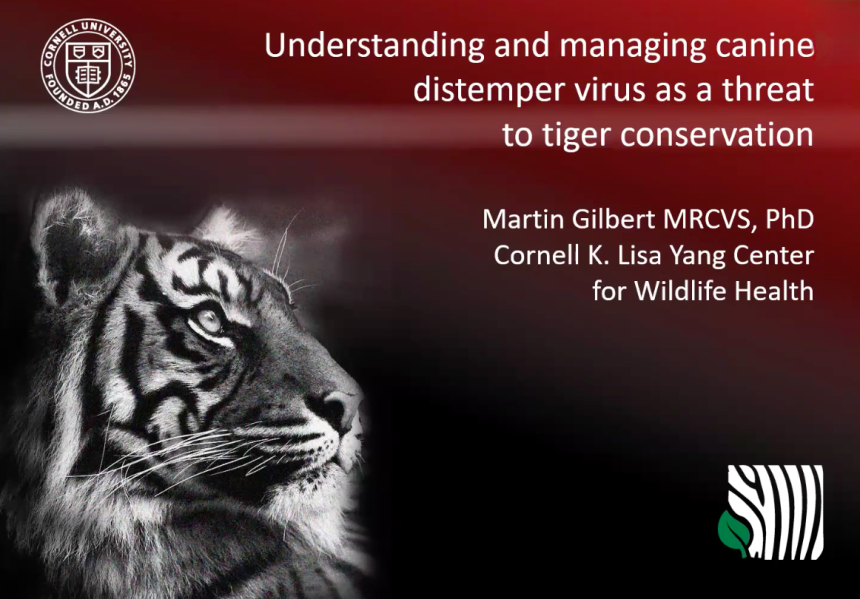In the News

For Your Information
December 02, 2024
Researchers including Cornell's Dr. Martin Gilbert discuss how developing vaccines and vaccination programs for free-living endangered wildlife could help conservation efforts to prevent extinctions from disease threats.

Podcast
August 22, 2024
Tigers, leopards and now one-horned rhinos. Dr. Martin Gilbert studies them all. As a wildlife veterinarian and epidemiologist at Cornell, Dr. Gilbert has investigated infectious diseases and mysterious mass die-offs all over Asia. Check out this latest podcast featuring his work.

Podcast
June 13, 2024
On this Cornell Veterinary Podcast, Dr. Martin Gilbert discusses his decades-long experience working in the nonprofit sector and in academia on international wildlife conservation projects in settings as diverse as Greenland, Papua New Guinea and Madagascar.

Video
April 26, 2024
Cornell's Dr. Martin Gilbert gives a presentation on "Understanding and Managing Canine Distemper Virus as a Threat to Tiger Conservation" at Cornell University's Department of Natural Resources and the Environment in March 2024.

Video
April 12, 2024
In this eCornell keynote presentation, Dr. Martin Gilbert, Helen Lee, and Laura Bernert from the Cornell K. Lisa Yang Center for Wildlife Health share their fieldwork experiences in Asia and help illustrate how the health of wildlife and our own health and well-being are inextricably linked.

February 14, 2024
Cornell University’s College of Veterinary Medicine announced a gift of $35 million to support the Cornell Wildlife Health Center, which has been renamed to the Cornell K. Lisa Yang Center for Wildlife Health in recognition of the scale of commitment to planetary health from the donor, Lisa Yang.

January 30, 2024
A transformational gift from philanthropist and Cornell alumna K. Lisa Yang ’74 will endow and rename the Cornell Wildlife Health Center as the Cornell K. Lisa Yang Center for Wildlife Health at the College of Veterinary Medicine.

October 20, 2023
Dr. Martin Gilbert, our wild carnivore health specialist, reflects on his decades-long research into canine distemper virus in endangered wild tigers, from the Russian Far East to Southeast Asia, and the valuable partnerships he has developed to help implement disease surveillance systems to monitor wild tiger health.

September 13, 2023
It was 5:30 am and I was already sweating when I stepped out of my wooden sleeping hut and into the steamy dawn at Nepal’s Chitwan National Park. It was already 85°F but would reach 105°F before noon. I was up before the sun to complete my summer intern research project - a census of free-roaming domestic dogs in the park’s buffer zone....

May 04, 2023
In the past century, the global tiger population has dwindled from over 100,000 to between 3,726 and 5,578 animals. In this literature review led by Cornell, researchers suggest disease surveillance is increasingly important as tiger populations decline and become more vulnerable to disease outbreaks.
